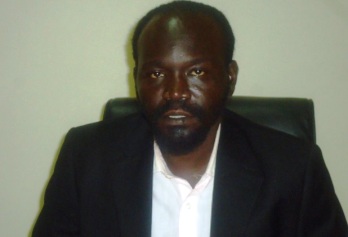S. Sudanese minister commends Sudan for hosting refugees
August 31, 2022 (JUBA) – South Sudan’s Humanitarian Affairs and Disaster Management minister, Mayen Majondit has commended the leadership of Sudan’s Sovereignty Council for hosting of South Sudanese living in the country.
“As the government under the leadership of his Excellency, the president of the republic, General Salva Kiir Mayardit, the leadership of Gen. Abdel Fattah Al-Burhan has moved our relations a step higher from what it was before. Now our people are moving freely in Sudan, just the same way Sudanese nationals in South Sudan do not feel being foreigners in South Sudan,” said Majondit.
He added, “Actually, ordinary people do not feel there are two countries when coming to South Sudan from Sudan and when they do their business here. You may have noticed our markets, especially are run, and owned mostly by brothers from Sudan. The restaurant too. Take a look at the best restaurant in Hai Thoura in Juba and in other places like Aweil, Northern Bahr El Ghazal [State]”.
The minister revealed that most of the people affected by the conflict in the states of Unity and the Upper Nile region find it easy to return to Sudan because of the understanding that they will be treated with respect and care, not like foreigners.
He commended the two countries for signing four economic freedoms in 2012.
The agreement, according to the Humanitarian Affairs minister, allowed nationals of either country to enjoy freedoms of residence, movement, freedom to undertake economic activities without restriction as well as freedom to acquire a property.
These properties, he stressed, can be disposed without any form of restrictions.
“There is this saying in English that the proof is in the pudding. This means that the citizens of the two countries have tasted the benefits of the four freedoms and the implementation of this agreement has consolidated the bilateral relation between them in the political and economic areas,” explained Majondit.
South Sudan and Sudan signed several agreements under the overall umbrella of a cooperation agreement in 2012. The agreement was ratified by the two parliaments, giving citizens the economic freedom to decide where to reside and do business without restriction in either country.
It agreement further permits them to acquire and dispose of properties and work.
He said recent clashes between the two-armed groups in Upper Nile have caused displacement into the neigbouring states of Unity, Jonglei, Ruweng, and the Abyei administrative areas. Others have fled to Sudan in search of safety from conflict and floods which besieged and destroyed several properties.
Majongdit explained that latest reports from humanitarian organizations show that the escalation in tensions and conflict in Tonga resulted in the displacement of thousands of people across several areas between Malakal and Tonga.
In Upper Nile State alone as of 21 August, 2022, rapid assessments conducted by humanitarian organizations and the government estimate that 2,000 people have fled from Tonga to Agunjuok; over 3,000 people fled to Abujop; a further 2,000 people arrived in Adidyang (25 km from Malakal,40 minutes by boat. In Malakal, 298 people arrived at the Protection of Civilians (PoC) site. In Jonglei State, it is estimated that over 3,300 people from New Fangak have moved to Old Fangak. In Unity State, 130 people arrived in Wunkur, Ruweng Administrative Area. In the Abyei Administrative Area, the United Nations Interim Security Force for Abyei (UNISFA) reported the arrival of 266 people displaced from Tonga to Abu Quassa.
South Sudan is also hosting Sudanese refugees mainly in the Blue and in the Nuba Mountain areas. Some of the refugees come from the war-hit region of Darfur into areas under the territorial jurisdiction of West and Northern Bahr el Ghazal states.
The 11-member Sovereignty Council of Sudan was the collective head of state of Sudan from 20 August 2019, when it was created by the August 2019 Draft Constitutional Declaration, until 25 October 2021, when it was dissolved following a coup d’état.
(ST)

